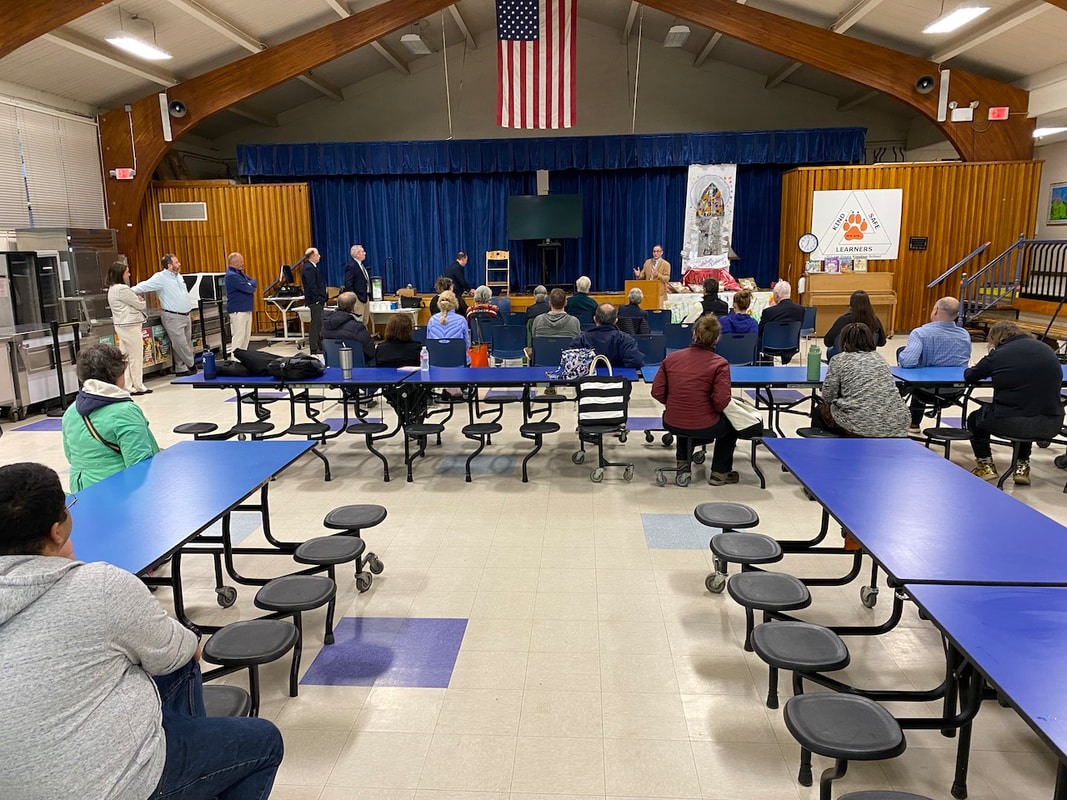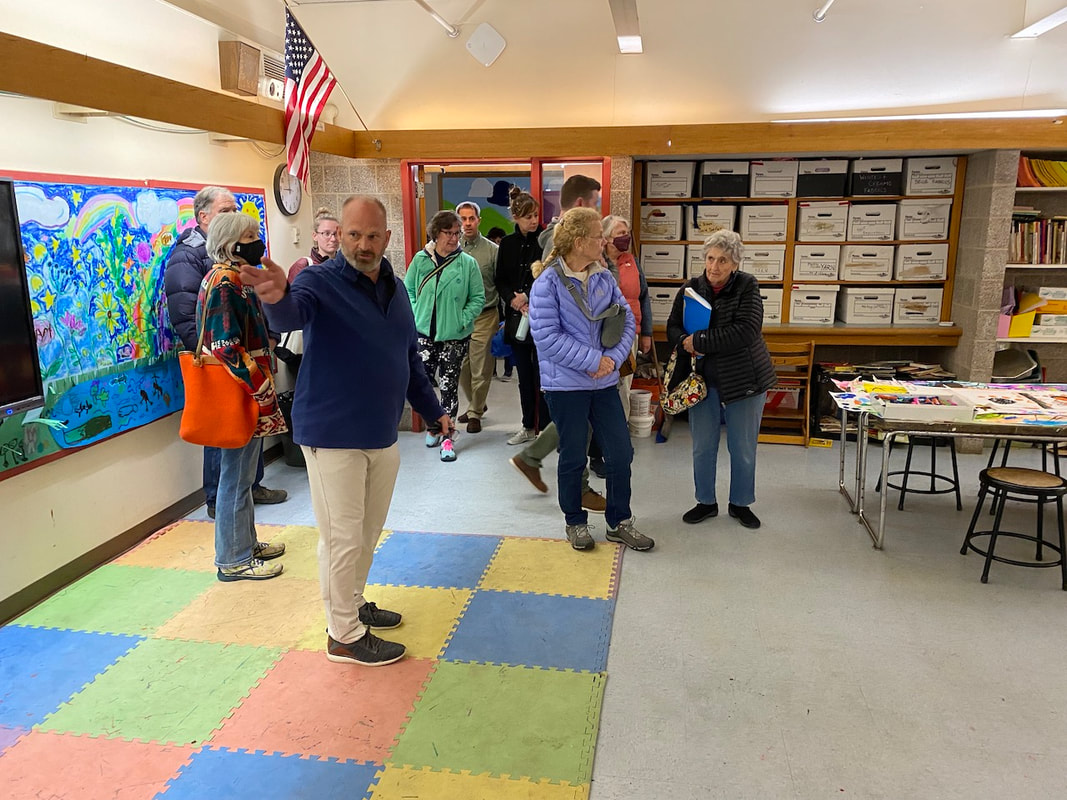|
by Glenn C. Koenig, webmaster at Town Wide Mall Maynard, MA - Approximately 25 residents attended a meeting at 7 PM Wednesday evening, hosted by the town's Green Meadow School Building Committee. The town is proposing to replace the existing school building, Maynard's only elementary school, with an entirely new building, funded partly by the state. The purpose of the meeting was to review the Schematic Design document, prepared for the project (to submit for state funding), answer questions, and gather input from the public. Members of the committee, representatives from Mount Vernon Group Architects, as well as the school's principals were all on hand to join in the presentation. Details of that document are available on the Project's web site: https://www.maynard.k12.ma.us/o/green-meadow-school/page/gm-building-project-information A representative of WAVM was there with a video camera to record the meeting for later posting on their web site: https://www.youtube.com/@WAVMproductions/videos
One member of the public commented that, in the long run, a heat pump system would actually cost the town less than any other option, even though the initial equipment cost would be slightly higher. She cited statistics from the Schematic Design document itself. The break-even point, she contended, would vary based on the amount of rebates obtained, but regardless, it would occur well before the end of the lifespan of the building. Once the meeting was adjourned, the school's Principal led a tour through the current building for those interested. The group looked at representative sample of classrooms and other areas, making a full circuit of the hallways, many of which slope up or down in the building's most recent addition. We were told that this was done originally to avoid blasting to demolish the ledge (solid rock outcroppings) beneath those portions of the building. === Comment === In the interest of full disclosure, I was at this meeting in two capacities: As a reporter and as an interested citizen. I have done my best to write the above report as objectively as possible, but of course, there were way too many comments and points made to detail them all here. While at the meeting, I made a number of observations and had some thoughts regarding what we're facing overall. The setup: • I was disappointed that the sound system was not employed. I saw loudspeakers mounted in the room, but I do not know why they were not in use. There were no microphones present and there were refrigerators on one side of the room making significant noise. If you view some of the video posted above, you may get some idea of how hard it was to hear the presenters. It was even more difficult to hear the questions asked by those attending. The presenters did attempt to repeat the questions asked, but on occasion didn't remember to do so. • The screen used by the presenters was much too small for the fine detail on most of the slides, many of which were taken directly from the document itself, with text much too small for audience projection. Most people could not read them from where they were sitting; some people had to interrupt to ask the presenters read some content to them. Attendees were invited to access the document online, after the meeting, in order to see the details they might have missed. • When members of the audience wanted to speak, no one invited them to stand in order to be heard more clearly. I'm not pointing all this out to blame anyone in particular, because I don't know what factors might have contributed to this situation. Sadly, I have experienced similar setups in other towns, and it seems counterproductive when the object is to inform the public and gather their input. It certainly left me straining to hear and view the material. The challenge: • The document being presented and discussed at this meeting is over 1600 pages long. It includes much in the way of detailed technical information. This presents a significant challenge to anyone in town to find the time to adequately understand the material it contains, in order to better decide how the town should proceed. • A significant number of questions could not be answered by the presenters because information is not yet available. Again, this is the document needed to submit to the state in order to obtain the $30 million in state funding. This lack of answers has resulted for a variety of reasons - some government programs and regulations are still in flux and some details cannot be worked out until after a vote to proceed on the project overall takes place - there just aren't the funds available right now, to pay for all the additional research ahead of time. So voters this fall will be asked to trust that those details will be worked out to their satisfaction, after approving funding for the project. The Big Picture: • The classic difficulty faced by many towns is that state funds are often insufficient to help towns maintain and improve school buildings properly over the years, whereas significant grants are available to tear them down and build new ones. This leaves towns with difficult override votes, followed by tax increases that can last for 20 years or more. • An $83 million building project is an incredibly complex undertaking, something that has become increasingly difficult to present to the public who will have to pay for it. We are a far cry from the old wooden schoolhouse with a pot belly stove for heat and chairs in rows, bolted down to the floor. In those days, the public could easily understand what was being built and vote accordingly. Now it's a completely different story. No, I'm not recommending returning to that era, but our government decision making process is still quite similar to what it was back then. We still have meetings and votes, we just have more people, more requirements, more details, and much greater costs involved. We've added telephones, cars, radio, TV, web sites, social media, and cell phones to our lives since those old days, yielding a level of complexity unimaginable back then. It's no wonder that many people feel overwhelmed by government process and opt to let others make decisions for them, for better or worse. The Future: It is human nature to postpone major changes until a crisis occurs. Again and again, I hear recommendations that we become more proactive, instead of reactive. That is, look at where trends are going and start developing plans for alternatives before the crisis is on top of us. We certainly live in times of rapid and profound change, which makes future projections even more daunting. And yet, I think finding at least some time to examine where we're headed is worth it. As our tax funded education systems become more and more expensive over time, just waiting for the crisis doesn't seem like a good idea. If the task of significantly changing the current system just seems impossible, may I suggest we look at how learning is supported in other countries, in other non-public schools, and in various other traditions. Of course, we may not want to just copy what others are doing, but we can certainly learn something and adapt it for our own purposes. Learning is a life long endeavor, after all, not just for those in school. § § § Note: If you discover any errors or factual inaccuracies in my reporting, please click once on the headline of the news story in question, then scroll down to the comment box and fill it in. I will endeavor to make changes as necessary.
6 Comments
Catherine Loeb
5/6/2023 10:24:02 am
One concern I have that I don't believe came up the other night is this:
Reply
Glenn Swanbon
5/6/2023 02:08:23 pm
There is no such thing as a free lunch when it comes to energy and in particular energy. There are pros and cons to every source. There seems to be this automatic assumption that gas will increase in price more then electricity. If you look at a state like CA they have had drastic electricity price increases exarcerbated by over aggressive mandates on EVs and renewables (brown outs as well).
Reply
5/7/2023 10:45:25 pm
Glenn Swanbon - I agree that there are pros and cons to everything. And it's true that predicting the future is a difficult task. So I do my best.
Reply
Sarah Pryputniewicz
5/9/2023 12:08:53 pm
As for natural gas reserves, there is no notable decrease in the amount of proved reserves in the United States. 5/9/2023 08:52:06 pm
Sarah, I agree with you that conservation is one of the best ways (the "negawatt") to reduce our environmental impact. I also agree that we have come a long way to reduce smog and other forms of pollution.
Reply
Sarah Pryputniewicz
5/10/2023 03:43:29 pm
A few thoughts:
Reply
Leave a Reply. |
AuthorWrite something about yourself. No need to be fancy, just an overview. Archives
June 2024
Categories |


 RSS Feed
RSS Feed